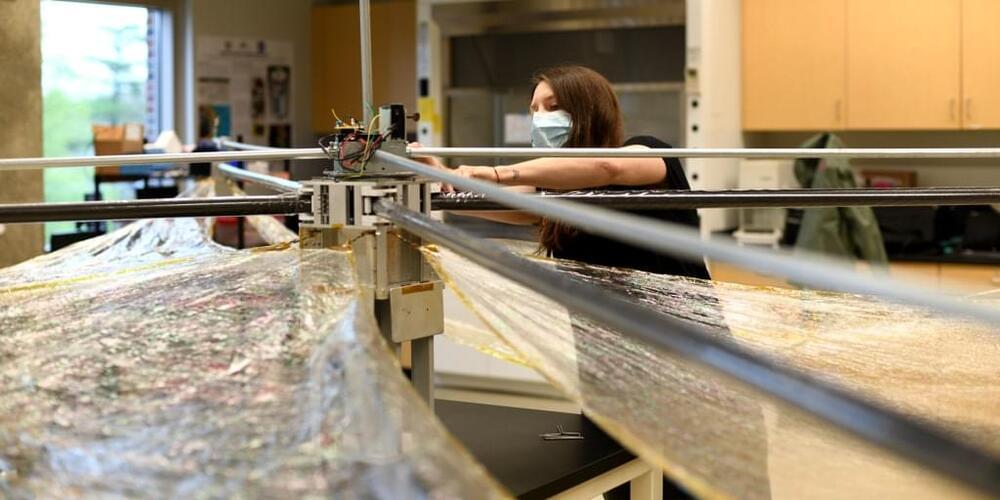She’s among a growing number of “grandfluencers,” folks 70 and up who have amassed substantial followings on social media with the help of decades-younger fans.
Joan MacDonald’s health was in shambles at age 71.

A year after first being used in trials, drones will be deployed to accompany the UK coast guard air and sea vessels during search and rescue missions. The first craft flown in will be a Schiebel S-100 uncrewed aerial vehicle (UAV), stationed at a helicopter base in the northern Wales coastal town of Caernarfon.
The Schiebel S-100 is a remotely flown safety overwatch and monitoring craft. It has been developed to help meet objectives of the UK’s revamped, tech-enhanced search and rescue services and assets program – the so-called UKSAR2G, due to begin operation in 2024.

The US Navy’s (USN’s) new autonomous technologies strategy seeks to accelerate development and deployment of intelligent platforms, linked through a highly distributed command-and-control (C2) architecture, to provide the necessary combat hardware to enable the sea service’s Project Overmatch requirements.
The Intelligent Autonomous Systems (IAS) strategy, as per senior service leaders, will be a “confluence of autonomy with unmanned systems and artificial intelligence (AI)” – from technology development and acquisition management to system maturation and infrastructure support across the enterprise, according to the strategy.
“IAS has the potential to provide high-impact, transformative operational and administrative capabilities in peacetime and wartime. These strategic goals cultivate a continuous development and operationalisation process for evolutionary and disruptive IAS technologies and concepts,” the strategy stated. “They also drive the adoption of operational IAS-based capabilities to provide continuous, effective, and efficient support … across all phases of force development and force application,” it added.


AS-REP Roasting is the technique that allows retrieving password hashes for users that have this flag set in Active Directory. Additionally, various cybersecurity and hacking tools allow cracking the TGTs harvested from Active Directory. These include Rubeus and Hashcat.
Using a tool like Rubeus, attackers can find the accounts that do not require preauthentication and then extract the ticket-granting ticket (TGT) data for cracking the password offline.
Data can be transformed into a format that can be cracked by an offline tool such as Hashcat, which can use brute force password cracking against the hashes. This process incorporates the use of a dictionary file for brute-force password guessing.

A now-patched high-severity security vulnerability in WhatApp’s image filter feature could have been abused to send a malicious image over the messaging app to read sensitive information from the app’s memory.
Tracked as CVE-2020–1910 (CVSS score: 7.8), the flaw concerns an out-of-bounds read/write and stems from applying specific image filters to a rogue image and sending the altered image to an unwitting recipient, thereby enabling an attacker to access valuable data stored the app’s memory.
Centaurus A shows off its “dark tendrils of dust” in a knockout glamor shot.

Engineers are set to test a device that could pull defunct spacecraft and used rocket parts back to Earth, allowing them to burn up harmlessly in the atmosphere.
Researchers at Purdue University in West Lafayette, Indiana, are launching a prototype drag sail Thursday aboard a rocket made by Firefly Aerospace, a private space company based in Austin, Texas. The mission is designed to assess how well the kitelike sail can de-orbit the rocket’s spent upper stage.
The launch is scheduled to take place at the Vandenberg Space Force Base in California between 6 p.m. and 10 p.m. PT.


Cats have many superior genetic mutations like night vision even immunity to the current pandemic. If we can find the key to their immunity we could find a way to have near super human immunity.
“Getting a better understanding of the cat’s biology and genetic makeup will help us better understand the biology of humans, too,” says Leslie Lyons. (Credit: Lottie/Flickr)
The findings, published in Trends in Genetics, come after decades of genome DNA sequencing by Leslie Lyons, professor of comparative medicine in the University of Missouri College of Veterinary Medicine. Their cat genome assembly is nearly 100% complete.